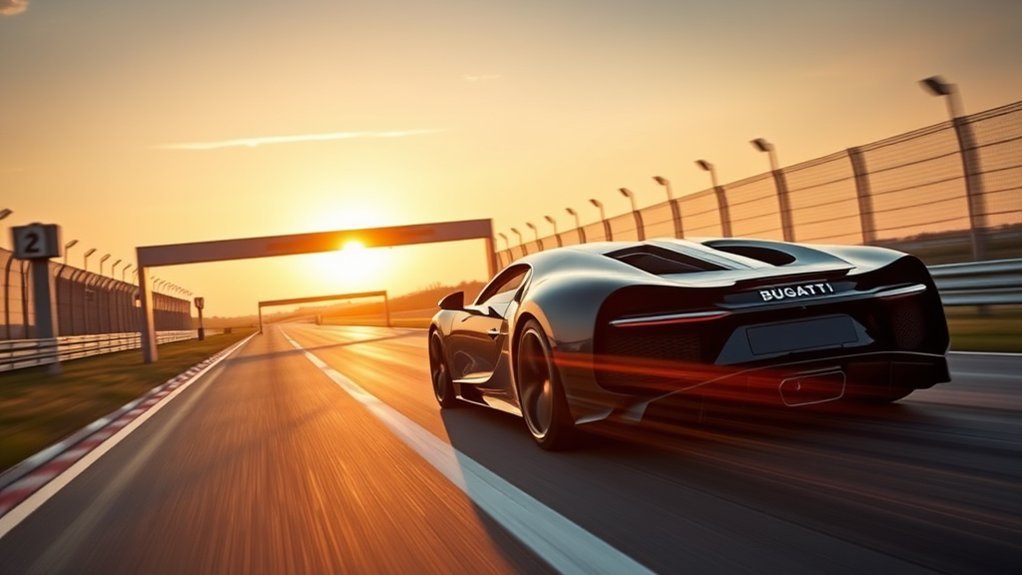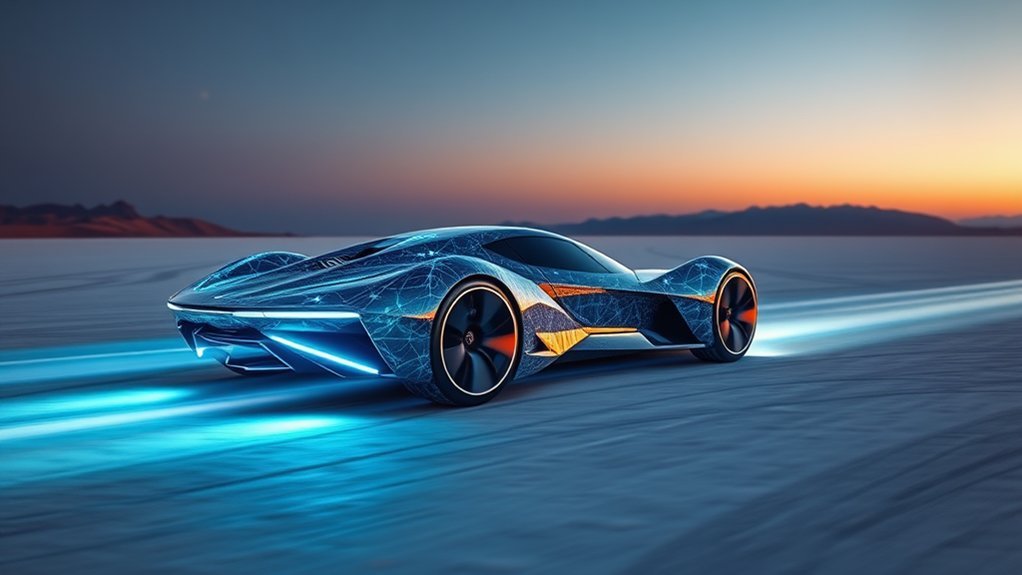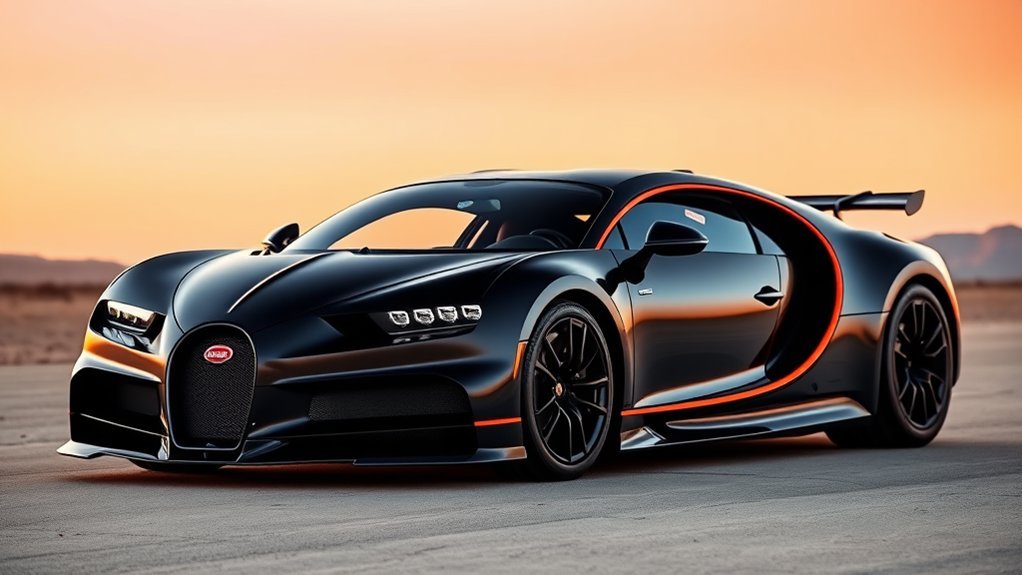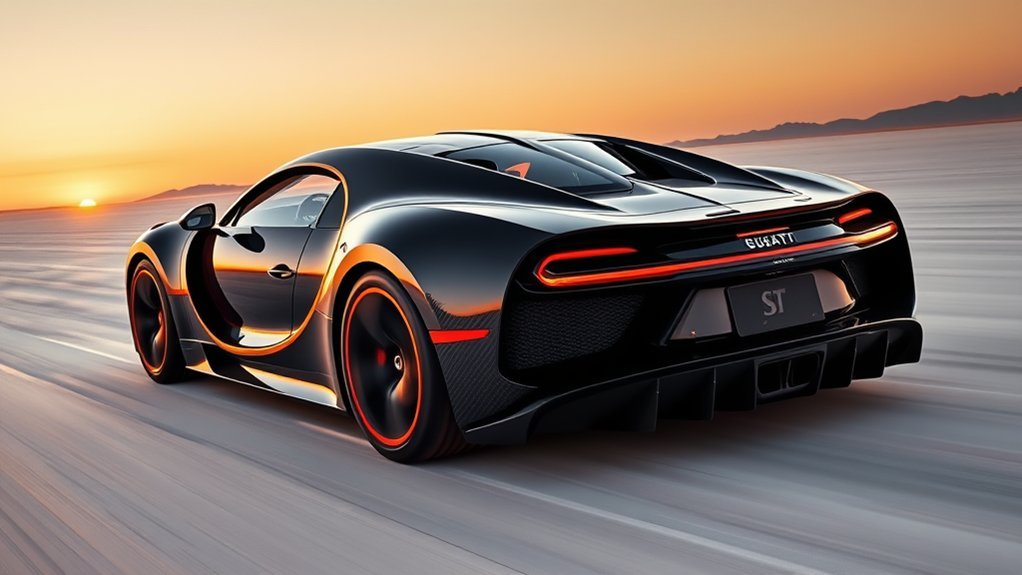Fastest Car in the World
The fastest car in the world is claimed to be the Koenigsegg Jesko Absolut, boasting a staggering top speed of over 310 mph, powered by a 1,600hp twin-turbo V8 engine. While contenders like the Bugatti Chiron Super Sport have reached impressive speeds, their records often face scrutiny due to measurement issues or disqualifications. The competition for speed remains intense and controversial, revealing fascinating advancements and challenges within automotive engineering—stay tuned for more insights into this thrilling world.
Key Takeaways
- The Koenigsegg Jesko Absolut claims a top speed of over 310 mph, making it a contender for the fastest car title.
- The Bugatti Chiron Super Sport previously held the record at 304.77 mph, but was disqualified due to a single-direction run.
- The SSC Tuatara's claimed speed of 331 mph faced scrutiny, with a verified top speed corrected to 295 mph.
- The Hennessey Venom F5 aims for speeds over 300 mph and features an impressive 1,817hp engine.
- Ongoing controversies and testing validity issues complicate the establishment of true speed records in the automotive world.
Overview of the Fastest Car in the World
When it comes to the fastest car in the world, the Koenigsegg Jesko Absolut stands out with its astonishing claimed top speed of over 310 mph.
This hypercar boasts a powerful 1,600hp twin-turbocharged V8 engine, making it a formidable contender among the fastest production cars.
While the Bugatti Chiron Super Sport previously held the record at 304.77 mph, the SSC Tuatara is also remarkable, officially reaching 295 mph.
Each of these machines showcases cutting-edge engineering, pushing the boundaries of speed and performance.
The quest for the ultimate top speed continues, igniting the passion for freedom on four wheels.
Top Speed Achievements

When we talk about top speed achievements, it's fascinating to see how manufacturers push the limits of engineering.
Cars like the Koenigsegg Jesko Absolut and SSC Tuatara set remarkable benchmarks, but verifying these speeds often presents its own set of challenges.
Let's explore both the record-breaking speeds and the complexities involved in ensuring these claims hold up under scrutiny.
Record-Breaking Speeds
As automotive technology advances, the race for the title of the fastest car in the world has become increasingly intense, showcasing remarkable engineering feats.
The quest for record-breaking speeds has led to incredible achievements:
- The SSC Tuatara reached a verified top speed of 295 mph.
- Bugatti's Chiron Super Sport 300+ broke the 300 mph barrier at 304.77 mph.
- The Koenigsegg Agera RS holds a notable legacy in this speed rivalry.
With contenders like the Hennessey Venom F5 aiming for over 300 mph, the pursuit of the fastest production car remains thrilling and ever-evolving.
Verification Challenges
While the allure of speed captivates enthusiasts and manufacturers alike, the verification of top speed achievements presents a labyrinth of challenges. Achieving official speed records requires rigorous two-way runs, ensuring accuracy.
Controversies like the SSC Tuatara's inflated claim highlight the pitfalls of unverified data—GPS errors can mislead even seasoned experts. The Bugatti Veyron's record faced scrutiny due to inconsistent measurement methods, while the Hennessey Venom GT's single-direction run lacks official recognition.
To truly embrace the limits of automotive technology, we need standardized verification processes that uphold integrity in the world of top speed records.
Engineering Innovations

Engineering innovations are at the heart of developing the fastest cars in the world, transforming the automotive landscape into a domain of unprecedented speed and performance.
Hypercars today leverage a blend of cutting-edge technologies that redefine what's possible on the road.
- Advanced aerodynamics minimize drag, as seen in the Koenigsegg Jesko Absolut with a drag coefficient of 0.278.
- Lightweight materials like carbon fiber enhance agility and speed, exemplified by the Rimac Nevera.
- High-performance engines deliver extraordinary power, such as the Hennessey Venom F5's 1,817hp twin-turbocharged V8.
These innovations push the boundaries of automotive excellence, creating exhilarating experiences.
Comparison of Leading Supercars

The landscape of supercars is a thrilling arena, where the fiercest contenders push the limits of speed and technology.
Take the Koenigsegg Jesko Absolut, claiming a staggering top speed of over 310 mph, though it's yet unverified. The SSC Tuatara, with a verified 295 mph, showcases its 1,750 hp twin-turbo V8.
The Koenigsegg Jesko Absolut aims for over 310 mph, while the SSC Tuatara boasts a verified 295 mph with its powerful twin-turbo V8.
Meanwhile, the Bugatti Chiron Super Sport 300+ hit 304.77 mph with its quad-turbo W16. Don't forget the Hennessey Venom F5, aiming for 300 mph, and the Rimac Nevera, an electric marvel at 256 mph.
Each represents the relentless pursuit of automotive freedom and innovation.
Record-Breaking Production Vehicles

As we plunge into the world of record-breaking production vehicles, it's clear that these remarkable machines aren't just about raw speed; they embody the pinnacle of automotive innovation.
The race to claim the title of the fastest production car has produced astounding feats, showcasing engineering excellence.
- SSC Tuatara: 295 mph with a twin-turbocharged V8
- Bugatti Chiron Super Sport 300+: 304.77 mph and a quad-turbo W16
- Bugatti Veyron Super Sport: Held the record from 2010-2017 at 267.856 mph
These cars not only push the limits but inspire a sense of freedom for enthusiasts everywhere.
Controversies and Claims

While speed captivates automotive enthusiasts, the controversies surrounding the quest for the fastest car in the world often overshadow the achievements themselves.
For instance, the SSC Tuatara's claimed top speed of 331 mph faced scrutiny due to GPS inaccuracies, settling at a verified record of 295 mph. Similarly, Hennessey's Venom GT reported a controversial speed of 270.49 mph, lacking validation as it was a one-direction run.
Bugatti's Chiron Super Sport 300+ recorded 304.77 mph, but its single-direction run disqualified it from production car records.
The automotive industry's lack of standardized measurement methods fuels ongoing disputes about these world records and their legitimacy.
Measurement Standards and Methods

Understanding measurement standards and methods is essential when evaluating claims about the fastest cars in the world. Top speed measurements rely on independent road tests, ensuring accuracy through two-way runs. Compliance with established measurement standards is vital for verification of speed records.
Evaluating the fastest cars requires adherence to measurement standards and independent testing for accurate speed verification.
- Speed limiters must be removed for accurate testing.
- Post-World War II vehicles need to exceed 200 km/h for eligibility.
- Independent verification reduces disputes over claimed speeds.
Without standardized methods, controversies around manufacturers' claims persist. To appreciate the thrill of production cars, we must embrace the rigor of these standards and the integrity of the verification process.
The Future of Speed in Automotive Technology

The automotive landscape is on the brink of a technological revolution that promises to redefine speed as we perceive it. Electric cars are leading this charge, offering instant torque that propels high-speed cars to astonishing limits.
Lightweight carbon materials, like those used in the Koenigsegg Jesko Absolut, allow for quicker acceleration and maximum speed. Furthermore, advanced technology in aerodynamics, as seen in the Bugatti Bolide, reduces drag considerably.
As engine technology evolves with innovations like turbocharging, we're witnessing electric hypercars aiming for over 300 mph. The future looks exhilarating, and I can't wait to see where this journey takes us.
Electric Powertrains and Their Impact

As electric powertrains continue to evolve, they're reshaping our understanding of speed and performance in the automotive domain.
With instant torque, cars like the Rimac Nevera can accelerate from 0-60 mph in just 1.9 seconds. Its lightweight construction enhances performance, while advanced computer systems optimize handling characteristics.
- Electric hypercars are achieving top speeds of 256 mph.
- Revolutionary battery technology enables competition with combustion engines.
- The combination of electric power and design excellence is redefining automotive freedom.
In this exhilarating domain, electric powertrains prove that the future of speed isn't just fast—it's extraordinary.
Notable Exclusions From Speed Records

When I look at the landscape of speed records, it's intriguing to see how many notable cars don't make the cut.
Unverified speed claims and single direction runs often keep remarkable vehicles, like the Hennessey Venom GT and Bugatti Chiron Super Sport 300+, from being officially recognized.
Additionally, modifications for testing can disqualify even the most impressive figures, raising questions about what truly qualifies a car for the title of fastest.
Unverified Speed Claims
Unverified speed claims often spark intense debate among car enthusiasts and industry experts alike.
The quest for the fastest car in the world is littered with controversy, as many high-speed assertions lack proper validation.
Consider these notable examples:
- The Devel Sixteen boasts a claimed top speed of 347 mph, but it remains untested publicly.
- The Hennessey Venom GT's record of 435.31 km/h was disqualified due to a single-direction run.
- The SSC Tuatara's initial claim of 331 mph was later corrected to 295 mph due to GPS issues.
These claims remind us that verification is vital in this high-stakes race.
Single Direction Runs
The debate surrounding speed records becomes even more complex when we consider single direction runs.
Fast cars like the Hennessey Venom GT and Bugatti Chiron Super Sport 300+ claimed astonishing top speeds, but their uni-directional runs disqualified them from official records.
The SSC Tuatara faced controversy over GPS errors, while the Lamborghini Countach 5000QV's modified testing led to exclusion.
Even the Pegaso Z-102 struggled with verification standards.
These instances highlight the challenges in establishing true world speed benchmarks, raising questions about credibility and the definition of what it takes to be recognized among the fastest cars on the planet.
Modifications for Testing
Although modifications can enhance a car's performance, they often raise questions about the legitimacy of speed records.
For instance, the Lamborghini Countach 5000QV's top speed was achieved through factory tweaks for testing, disqualifying it from production car records. Similarly, the Bugatti Chiron Super Sport 300+ faced disqualification due to its uni-directional run.
Here are some critical points to evaluate:
- Hennessey Venom GT's controversial single-direction claim.
- Devel Sixteen's unverified top speed remains in doubt.
- SSC Tuatara's GPS error controversy highlights testing flaws.
These instances show how modifications and testing parameters can blur the lines in the quest for the fastest cars.
Frequently Asked Questions
What Is the #1 Fastest Car in the World?
I've been fascinated by performance testing cars. The top speed of contenders hinges on engine power, aerodynamic design, weight reduction, and advanced tire technology. Each element plays an essential role in achieving that coveted speed.
What Car Goes 400 Mph?
I think reaching 400 mph in a car hinges on future innovations in electric vehicles, aerodynamics impact, and tire technology, all while maneuvering racing regulations. It's an exhilarating prospect that could redefine speed records.
Has Any Car Hit 700 Mph?
I've often wondered about 700 mph attempts. While no car's hit that mark, future hypercars promise aerodynamic innovations and technological advancements. Yet, safety challenges remain essential in this exhilarating pursuit of land speed records.
What Car Goes 0 to 60 the Fastest?
When I explore cars that accelerate fastest, I see how performance upgrades and diverse engine types, especially in electric vehicles, push speed records. This evolution reflects our racing history and the incredible advancements in automotive technology.
Conclusion
In the race for the fastest car in the world, it's astonishing to think that some vehicles can reach speeds exceeding 300 miles per hour—faster than most commercial jets during takeoff. As technology continues to evolve, blending innovation with engineering prowess, we're witnessing a thrilling era in automotive history. Whether it's through traditional combustion engines or the rise of electric powertrains, the pursuit of speed is relentless and enthralling, promising an exciting future for car enthusiasts everywhere.







